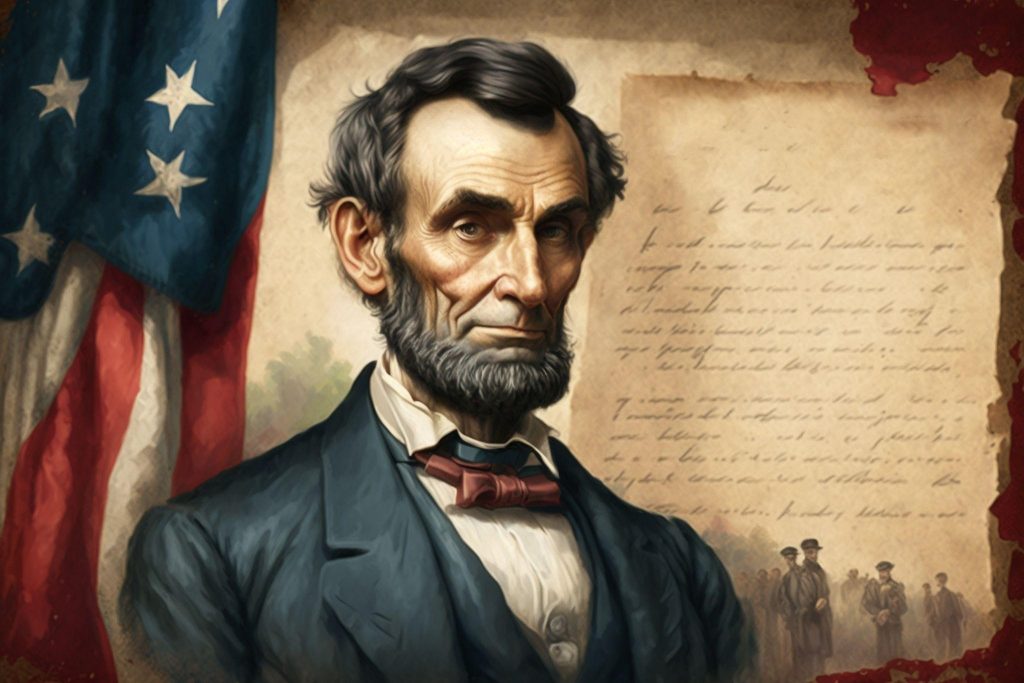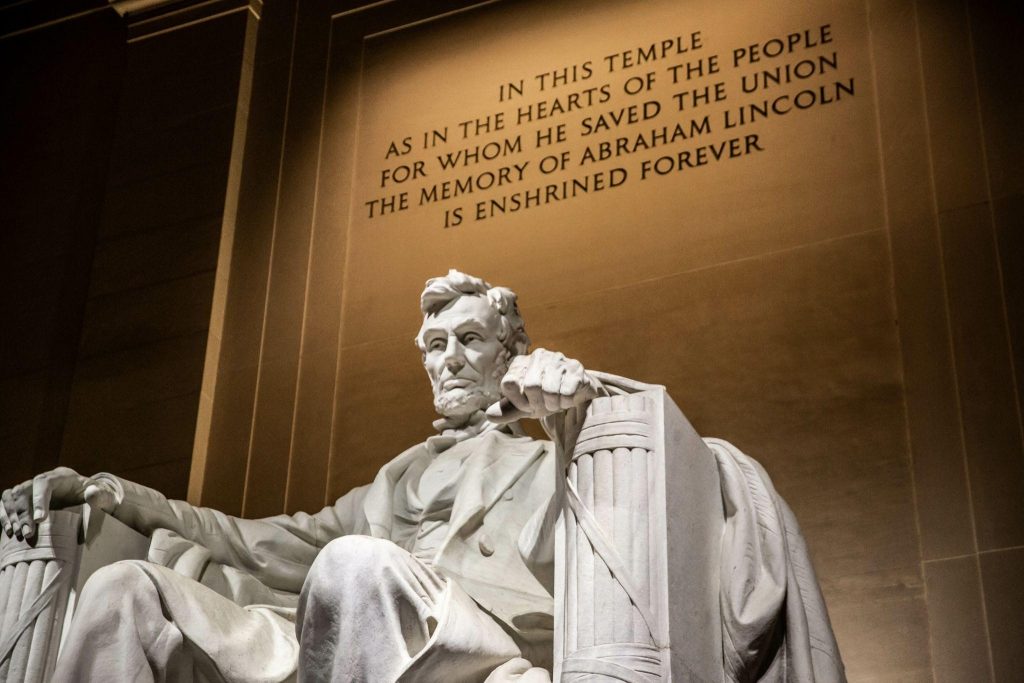THE WORLD’S #1 EXECUTIVE COACHING AND BUSINESS COACHING BLOG SINCE 2017.
Abraham Lincoln’s Authentic Leadership: A Blueprint for Today’s Leaders
November 7, 2023 | Category: Blog, Intelligent Leadership | Last updated on: March 12, 2025
The 16th President of the US, Abraham Lincoln, brought his authentic version of intelligent leadership to bear when the country faced bankruptcy amid the deadliest conflict ever on American soil. Due to his authenticity, focus on personal development, and sound character, Lincoln grew into a defining figure of US history through a tenure cut short by his assassination. His leadership is a model of intelligent leadership, rife with actionable lessons for leaders of the post-industrial age.
“No man has a good enough memory to be a successful liar.” – Abraham Lincoln.
Abraham Lincoln’s leadership and Presidency carry countless lessons for leadership coaching professionals.
Having grown up in poverty on the American Frontier, Abraham Lincoln was a self-educated lawyer and state legislator who would go on to become the 16th President of the United States.
Affectionately called Honest Abe, Lincoln embodied courageous, compassionate, and character-driven leadership. By steering the country through the turmoil of the Civil War, he ensured that he would forever be remembered as one of the most inspirational and representative presidents of the U.S.

Honest Abe’s Presidency inspires leadership integrity and compassion to this day.
It should be compulsory for leadership coaching specialists to study Abraham Lincoln’s historical leadership. Advocates of intelligent leadership – myself included – must consider Abraham Lincoln as a prime exponent of this leadership style.
The key to the relevance of Lincoln’s leadership is not only in his achievements but in how he achieved what he did. In addition to winning the Civil War and abolishing slavery, he saved the U.S. Government from bankruptcy and kept it funding its obligations.
He brought the nation back from the brink of collapse.
In his first address to the joint session of the Congress on July 4, 1862, Lincoln asked for soldiers and financial resources to deal with the greatest crisis that had ever befallen the nation. And he set a grand vision. He set out to unify the country, save it from bankruptcy, and end slavery. He also set the value framework that would guide his actions: the ideals upon which the Constitution and the Declaration of Independence rested.
Lincoln’s leadership was compassionate, courageous, creative, and focused on empowering people. Lincoln led by example, with integrity and confidence. He communicated carefully, keenly aware of his strengths and weaknesses in this respect. He embodied what we, leadership coaches, admire and respect in leaders.
Understanding Abraham Lincoln
I mentioned earlier that the “how” of Lincoln’s leadership was more relevant from a leadership coaching perspective than the sum of his accomplishments. That does not, in any way, diminish his historic bequest. By every standard, he was a presidential overachiever. Amid some of the direst headwinds of history, he:
- Ended slavery
- Preserved the Union
- Granted public land to farmers
- Provided people with access to education
- Established the Republican Party as a mainstay of the US political scene
- Reshaped and redefined the Presidency
- Managed to avoid foreign intervention in the Civil War through impressive diplomatic efforts.
Abraham Lincoln was a savior of the Union.
The leadership attributes I most admire in President Lincoln are his fundamental human empathy and willingness to show mercy to his enemies.
“It is impossible to imagine anything which better becomes a leader than mercy,” said Latin poet Lucio Anneo Seneca.
Indeed, it takes real character and a true leader’s heart to forgive someone who would never show one mercy had the roles been reversed. It took Lincoln near-prophetic foresight to assemble the most unusual cabinet in US history, bringing together an impressive selection of disgruntled opponents.
With genuine compassion comes the ability to empower people and inspire them to become the best they can be. From my perspective, Abraham Lincoln is much more than an inspirational historical figure who has defined the fate of our nation. His leadership is a perfect example of the style of leadership I value and try to emulate in my personal life and career. He is a fertile source of positive leadership references that can help leaders and coaches overcome adversity time and again.
Authenticity and Character
Abraham Lincoln’s character was one of integrity, humility, and compassion. He never feared voicing his opinions, even when they were unpopular. And he had a deep-seated proclivity for treating everyone equally.
Lincoln was no stranger to leading by example. The turbulent times over which he presided often had him in the line of fire.
In July 1864, he was visiting troops in Fort Stevens, Maryland, when rebels attacked the base. He stood on the battlements with the soldiers, bullets whizzing around him. He was more concerned with the wounded than with getting to cover.
As former slaves greeted him as a Messiah when he visited the Confederate capital of Richmond toward the end of the Civil War, Lincoln found the adulation embarrassing. Proclaiming himself “God’s humble instrument,” he assured the men that they would be treated as equal citizens of the Republic from there onward.
As one of the innermost elements of a leader’s capability map, the character is the source of many outer-core leadership competencies. People sense when their leaders are genuine. To be authentic, leaders must demonstrate that their leadership stems from character. As a leadership coaching specialist, I am aware that to effect change in a leader’s outer core, we must first effect change within the character.
Personal Growth and Continuous Improvement
Lincoln was keenly aware that he was not an attractive, visually charismatic man. He understood that communication was not his strong suit, yet, as a leader, he needed to excel at it.
Having identified his real and perceived weaknesses communication-wise, he overcame them. He improved the effectiveness of his communication by studying historical figures and famous speeches. He engaged in intentional exercises of active listening and focused on using stories to make his points.
Abraham Lincoln’s leadership was a work in progress to its very end. His leadership principles required him to continuously forge his leadership character, exploring new and perfecting old ways of connecting with his audience.
Transformative Moments of Lincoln’s Life and Leadership
Abraham Lincoln’s Presidency was tumultuous and tragically short. He experienced no shortage of transformative moments throughout this brief but eventful tenure.
Perhaps the most significant moment of his leadership occurred upon the delivery of his famous “House Divided” speech in 1858 before he became President. The speech marked the crystallization of his views on slavery and the Union. Through it, he established the leadership principles and values that would later guide his thoughts and actions as the 16th President of the United States of America.
Lincoln was not a naturally charismatic person.
For a leadership coaching specialist, continuous improvement and focus on personal growth are key elements of coaching philosophy. Abraham Lincoln’s attitude toward his leadership weaknesses and improvement is a worthy example for coaches and leaders alike.
Lessons for Today’s Business Leaders
Lincoln’s leadership principles are forever relevant for business leaders. Setting an example, staying close to the people, creating compelling visions of the future, and communicating effectively are not outdated.
Current and future business leaders can emulate the overarching philosophy behind Abraham Lincoln’s leadership and many of its practical aspects and attitudes.
A leitmotif of Lincoln’s Presidency was inspiring those around him and raising their minds to think at a higher level. Those are practical objectives all leaders should aim to accomplish through thorough, eloquent communication and future-oriented, self-aware thinking.
These are some of the core principles I have implemented in my business coaching. By developing leaders’ inner cores, a coach can effect meaningful change that defines how leaders think and act. By helping leaders shape their character, coaching can help them achieve the self-awareness they need to think at a higher level and the emotional intelligence they need to help others achieve the same level of thought.
Applying Abraham Lincoln’s Wisdom
As evidenced by Lincoln’s leadership example, true leaders do not allow petty differences to keep them from surrounding themselves with the best specialists.
Intelligent leaders transcend the often paralyzing dilemmas of the now and know that the higher cause for which they fight justifies many otherwise inconceivable compromises.
President Lincoln was intelligent and confident enough to secure the services of the best people for the good of the nation and country. He also knew how to harness the competing energies of his motley cabinet. He allowed its members to debate and contribute to his decisions, but he made the decisions himself, a case in point being his Emancipation Proclamation.
Character-born authenticity is the only way to embark on a successful journey of personal growth. Only authentic leadership coupled with leadership integrity can build trust. Only authenticity carries the emotional charge that allows leaders to spark genuine inspiration in those they lead.
Conclusion
Seen through the eyes of a leadership coach, Abraham Lincoln’s leadership is a textbook example of intelligent leadership in the modern sense of the concept.
America’s 16th President may have been slow to embrace emancipation and he may have struggled to manage his generals but he never hesitated to shape his character into the leader the country needed under those trying circumstances.
He was aware of his strengths and limitations and took personal development seriously. Through his authenticity and commitment to the values outlined in the Declaration of Independence and Constitution, he rescued a nation and country teetering on the edge of disaster, redirecting the flow of its history, and ultimately, that of the entire world.
If you want to learn more about leadership coaching and how coaches can help leaders become more authentic and effective, check out my leadership coaching services.




